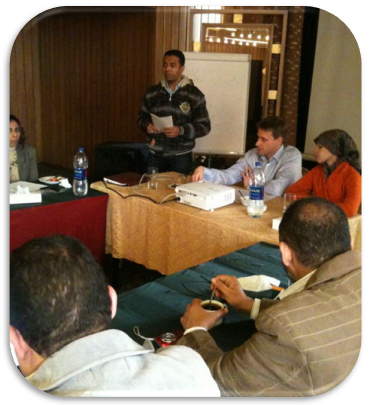Published: 7 March 2012
Region: Egypt
By Richard Cookson

If cats and mosquitoes had their own reporters, how would they cover the news? This improbable question had 17 journalists from Upper Egypt scratching their heads on the first day of a week-long course run by the Media Diversity Institute (MDI) in February 2012.
In an exercise that has been tried and tested by MDI around the world, the journalists were asked to cover the news that a large construction company was about to start building a new luxury hotel. But some of the participants were asked to imagine they were mosquitoes, while others were cats and a third group were builders. Before construction starts, they were also told, the firm intends to kill all of the local mosquitoes with insecticide to prevent the builders getting bitten.
The exercise was designed to show that the same event can be perceived in radically different ways by different groups, depending on how it affects them. In Egypt, the builders effusively welcomed the announcement, while the mosquitoes saw it is as a catastrophe. It was a good way of raising profoundly important questions about the role that journalists play when reporting on controversial stories in the real world. How do they ensure that all sides in a debate are represented? How do they ensure fairness and accuracy? How do they safeguard freedom of speech? And what about the views of minority groups that are usually overlooked by the media?
The training helped the participants develop their understanding of diversity in Egypt and improve their professional skills so that all sections of society have the chance to contribute to public debate. They debated the importance of freedom of speech, were given practical advice about staying safe during assignments, and also spent time with people from minority groups – including a young Nubian woman, a disability rights activist, a Coptic Christian, and a female lawyer who works on women’s rights – who provided insights about the way their group is treated by the media and how reporting can be improved.

The participants were also shown the impact on society of poor journalism across the world, particularly in Britain where inaccurate, prejudicial and stereotypical reporting of several minorities, such as Muslims and asylum-seekers, have profoundly affected pubic perception of them.
At the end of two intensive days in the classroom, the journalists pitched ideas for features they wanted to write. Over the next four days, they investigated a wide range of issues – from child labour in stone quarries to why some Christians are campaigning to change the Egyptian Church’s rules on divorce. This helped them put some of their new skills into practice and understand some of the ethical challenges they may face when reporting on groups often ignored by much of the media.
At the end of the week, the trainers – Abeer Saady, a prominent Egyptian journalist and the vice-chair of the Egyptian Journalists’ Syndicate, and Richard Cookson, a British print and TV journalist – encouraged the participants to think practically about how they could improve their own coverage when they return to their day-jobs. The material the journalists produced will be published by the newspapers they work for and will also be available on MDI’s website.
MDI has been working in Egypt since 2006 and has delivered a series of training courses to help journalists better reflect diversity in their reporting, improve their understanding of freedom of expression and raise journalistic standards. This training course was part of a broader MDI programme in Egypt funded by the Swedish International Development Agency. For more information on this project please contact: doaa.kassem@media-diversity.org